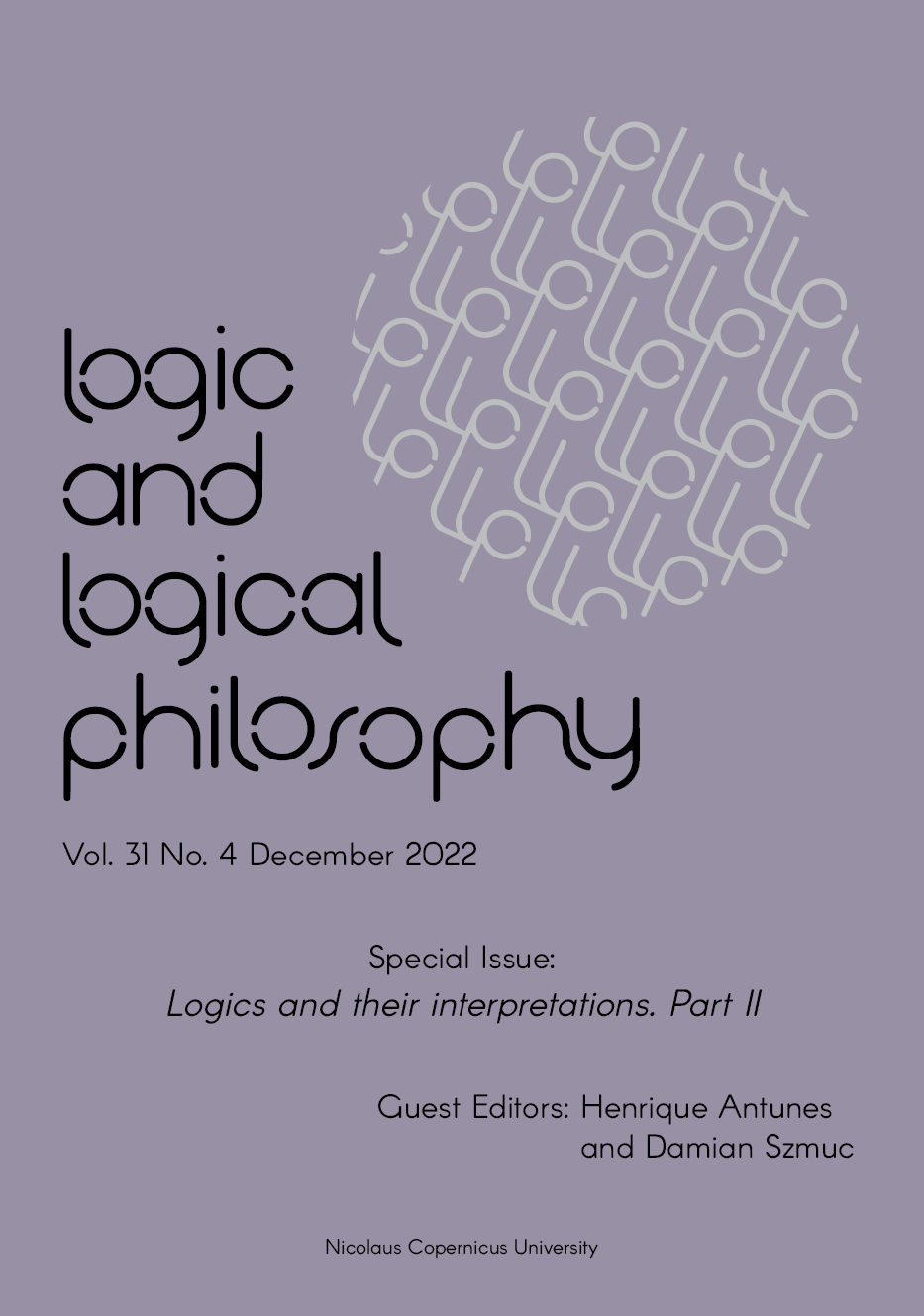A Four-Valued Logical Framework for Reasoning About Fiction
DOI:
https://doi.org/10.12775/LLP.2022.020Słowa kluczowe
philosophy of fiction, fictional names, logic of fiction, four-valued logicsAbstrakt
In view of the limitations of classical, free, and modal logics to deal with fictional names, we develop in this paper a four-valued logical framework that we see as a promising strategy for modeling contexts of reasoning in which those names occur. Specifically, we propose to evaluate statements in terms of factual and fictional truth values in such a way that, say, declaring ‘Socrates is a man’ to be true does not come down to the same thing as declaring ‘Sherlock Holmes is a man’ to be so. As a result, our framework is capable of representing reasoning involving fictional characters that avoids evaluating statements according to the same semantic standards. The framework encompasses two logics that differ according to alternative ways one may interpret the relationships among the factual and fictional truth values.
Bibliografia
Avron, A., and A. Zamansky, “Non-deterministic semantics for logical systems”, pages 227–304 in Handbook of Philosophical Logic, vol. 16, 2011.
Bacon, A., “Quantificational logic and empty names”, Philosophers’ Imprint, 13 (2013).
Badura, C., and F. Berto, “Truth in fiction, impossible worlds, and belief revision”, Australasian Journal of Philosophy, 97, 1 (2019): 178–193. DOI: http://dx.doi.org/10.1080/00048402.2018.1435698
Bencivenga, E., “Free logics”, pages 147–196 in D. M. Gabbay and F. Guenthner (eds.), Handbook of Philosophical Logic, 2 ed., vol. 5, Springer, 2002.
da Costa, N. C. A., “On the theory of inconsistent formal systems”, Notre Dame Journal of Formal Logic, 15, 4 (1974): 497–510. DOI: http://dx.doi.org/10.1305/ndjfl/1093891487
Evans, G., “Understanding demonstratives”, in Collected Papers, Oxford University Press, 1985.
Everett, A., “Against fictional realism”, The Journal of Philosophy, 102, 12 (2005): 624–649. DOI: http://dx.doi.org/10.5840/jphil2005102129
Frege, G., “Sense and reference”, The Philosophical Review, 57 (1948): 209–230.
Frege, G., Posthumous Writings, Blackwell, 1979.
Gottwald, S., “Many-valued logic”, in E. N. Zalta (ed.), The Stanford Encyclopedia of Philosophy, Summer 2020 edition, Stanford University. https://plato.stanford.edu/entries/logic-manyvalued/
Ivlev, J. V., “A semantics for modal calculi”, Bulletin of the section of logic, 17 (1988): 114–121.
Jaquette, D. (ed.), Philosophy of Logic, 5 ed., Handbook of the Philosophy of Logic, North Holland, 2007.
Kearns, J., “Modal semantics without possible worlds”, The Journal of Symbolic Logic, 46, 1 (1981): 77–86. DOI: http://dx.doi.org/10.2307/2273259
Kripke, S. A., “Quantified modality and essentialism”, Noûs, 51, 2 (2017): 221–234. DOI: http://dx.doi.org/10.1111/nous.12126
Lehmann, S., “Strict Fregean free logic”, Journal of Philosophical Logic, 23, 3 (1994): 307–336. DOI: http://dx.doi.org/10.1007/BF01048484
Lehmann, S., “More free logic”, pages 197–259 in D. M. Gabbay and F. Guenthner (eds.), Handbook of Philosophical Logic, 2 ed., vol. 5, Springer, 2002.
Marcos, J., “Nearly every normal modal logic is paranormal”, Logique et Analyse, 48 (2005): 279–300.
Nolt, J., “Free logics”, pages 1023–1060 in: Jaquette, D. (ed.), Philosophy of Logic, 5 ed., Handbook of the Philosophy of Logic, North Holland, 2007.
Omori, H., and T. Waragai, “Some observations on the systems LFI1 and LFI1∗”, pages 320–324 in F. Morvan, A. M. Tjoa, and R. Wagner (eds.), Proceedings of DEXA2011, 2011, IEEE computer society.
Orlando, L., “Fictional names without fictional objects”, Revista Hispanoamericana de Filosofía, 40 (2008): 111–127.
Priest, G., “Sylvan’s box: a short story and ten morals”, Notre Dame Journal of Formal Logic, 38, 4 (1997): 573–82. DOI: http://dx.doi.org/10.1305/ndjfl/1039540770
Sainsbury, R. M., Reference Without Referents, Oxford University Press, USA, 2005.
Sano, K., and H. Omori, “An expansion of first-order Dunn-Belnap logic”, Logic Journal of the IGPL, 22, 3 (2013): 458–481. DOI: http://dx.doi.org/10.1093/jigpal/jzt044
Sawyer, S., “The importance of fictional properties”, pages 208–229 in S. Brock and A. Everett (eds.), Fictional Object, Oxford University Press, 2015. DOI: http://dx.doi.org/10.1093/acprof:oso/9780198735595.003.0009
Suppes, P., Axiomatic Set Theory, 2 ed., Dover, 1972.
van Dalen, D., Logic and Structure, 5 ed., Springer, 2013. DOI: http://dx.doi.org/10.1007/978-1-4471-4558-5
Woods, J., “Fictions and their logic”, pages 1061–1126 in: Jaquette, D. (ed.), Philosophy of Logic, 5 ed., Handbook of the Philosophy of Logic, North Holland, 2007.
Pobrania
Opublikowane
Jak cytować
Numer
Dział
Licencja
Prawa autorskie (c) 2022 Newton Marques Peron, Henrique Antunes

Utwór dostępny jest na licencji Creative Commons Uznanie autorstwa – Bez utworów zależnych 4.0 Międzynarodowe.
Statystyki
Liczba wyświetleń i pobrań: 1747
Liczba cytowań: 0







